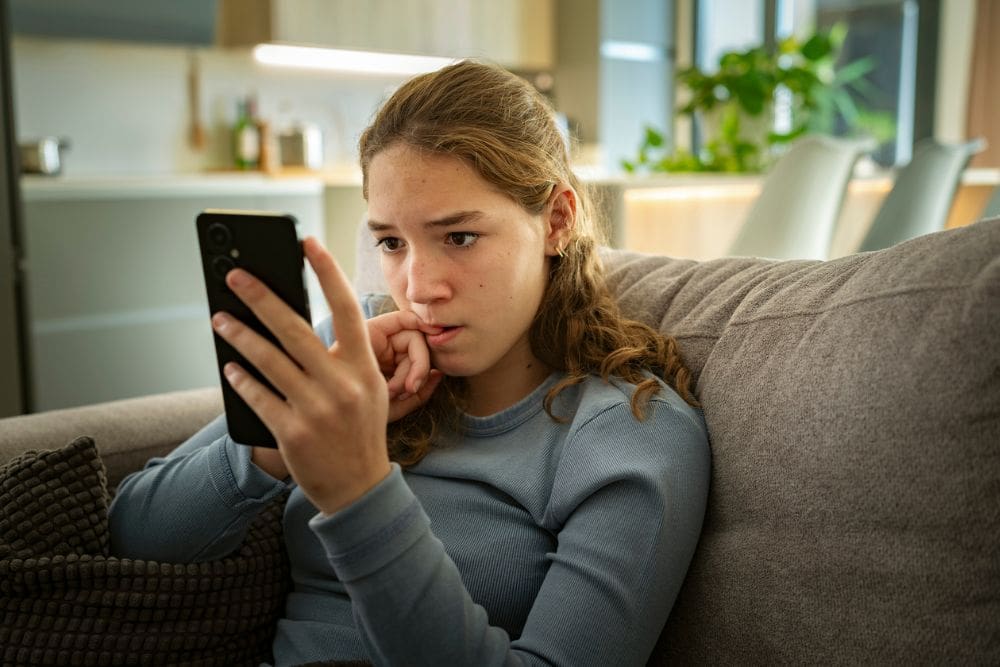Social media is part of nearly every teen’s daily life. It’s where they connect with friends, share moments, and express themselves. Platforms like Instagram, TikTok, and Snapchat can be creative outlets, a source of information, and a way to feel connected to others. But as you may have already noticed, social media also has a darker side—one that can quietly influence your teen’s mood, self-esteem, and overall mental health.
If your adolescent spends hours scrolling, posting, or comparing themselves to others online, it’s important to understand how this constant exposure can impact their emotional well-being. By learning the potential benefits and risks of social media, you can help your teen develop a healthier relationship with technology.
The Positive Side of Social Media
Social media isn’t all bad. In fact, when used mindfully, it can be a valuable tool for adolescents. Some of the benefits include:
- Connection and belonging. Social media helps teens stay in touch with friends and family, even when they’re apart. This can be especially helpful for adolescents who struggle with in-person socializing or live far from their peers.
- Self-expression. Teens can share their creativity through art, music, photography, and writing, helping them build confidence and find their voice.
- Support networks. Online communities can provide encouragement and understanding for teens facing challenges like chronic illness, mental health struggles, or unique life circumstances.
- Access to information. Social media gives teens a way to learn about important topics, discover new interests, and hear diverse perspectives.
When balanced with offline activities, these positives can contribute to a teen’s personal growth and social skills. But without boundaries, the negatives can quickly outweigh the benefits.
When Social Media Turns Harmful
While there are upsides, the reality is that social media can also contribute to depression, anxiety, and other mental health struggles—especially when use becomes excessive or unhealthy.
The Trap of Constant Comparison
Scrolling through curated feeds can make it seem like everyone else’s life is better—more exciting, more beautiful, more successful. Your teen may compare their everyday reality to the highlight reels they see online, leading to feelings of inadequacy, low self-esteem, and even hopelessness. Over time, this constant comparison can chip away at their confidence and sense of self-worth.
Cyberbullying and Online Harassment
Unlike face-to-face bullying, online harassment can follow a teen everywhere. Cruel comments, exclusion from group chats, and hurtful rumors can be devastating—especially since the digital world doesn’t have an “off” switch. Victims of cyberbullying are more likely to experience anxiety, depression, and suicidal thoughts.
Sleep Disruption and Mood Changes
Many teens scroll late into the night, disrupting their natural sleep cycle. Poor sleep affects more than just energy levels—it impacts mood regulation, concentration, and overall mental health. Research shows a strong link between lack of sleep and higher rates of depression and anxiety in adolescents.
Helping Your Teen Set Healthy Boundaries with Social Media
As a parent or caregiver, you can’t eliminate your teen’s exposure to social media—but you can guide them toward healthier habits. Here are some strategies to try:
- Encourage screen-free time. Limit screen time by designating certain hours of the day (like dinner or the hour before bed) as device-free zones. This gives your teen a mental break and helps protect their sleep.
- Model healthy use. Teens notice your habits. By putting your own phone down and being present, you show that it’s possible—and valuable—to unplug.
- Talk about what they see online. Ask your teen how they feel after scrolling. If certain content makes them anxious or insecure, discuss ways to unfollow, mute, or limit exposure.
- Promote offline activities. Help your teen explore hobbies, sports, volunteering, or in-person friendships. A balanced life reduces dependence on online validation.
- Set privacy and safety rules. Teach your teen how to protect their personal information, avoid harmful interactions, and report inappropriate content.
How Creekside Can Help Adolescents
Sometimes, despite your best efforts, your teen’s mental health may still be suffering. If you’ve noticed major mood changes, withdrawal from friends, declining grades, or any signs of self-harm, it’s important to seek help quickly.
The clinical team at Creekside Behavioral Health in Kingsport, Tennessee offers specialized behavioral treatment for adolescents between the ages of 7 and 17. We understand that helping your child get the treatment they need can be overwhelming—not just because of your concern for them, but because of the emotional toll it takes on you as a parent or caregiver.
At Creekside, we make this process easier by providing psychiatric services tailored to the unique needs of young people. Our inpatient treatment options are available for adolescents admitted voluntarily or involuntarily and include:
- Immediate assessment. A thorough evaluation to understand your teen’s needs and challenges.
- Diagnosis. Identifying the mental health conditions or stressors affecting your child.
- Rapid stabilization. Focused care to address acute psychiatric symptoms and help your teen regain stability.
Our goal is to provide a safe, compassionate environment where adolescents can begin to heal. We work closely with families to ensure each teen’s treatment plan includes emotional support, coping strategies, and a path toward recovery.





